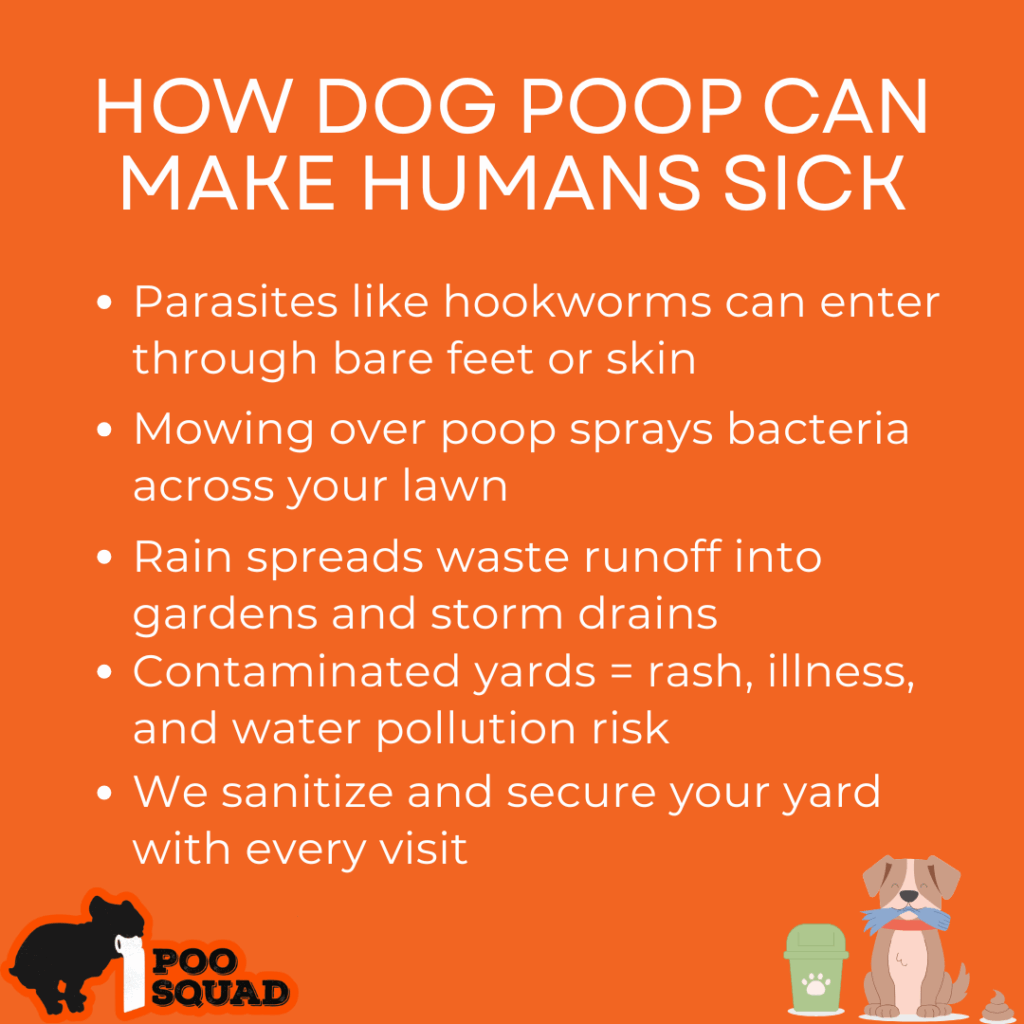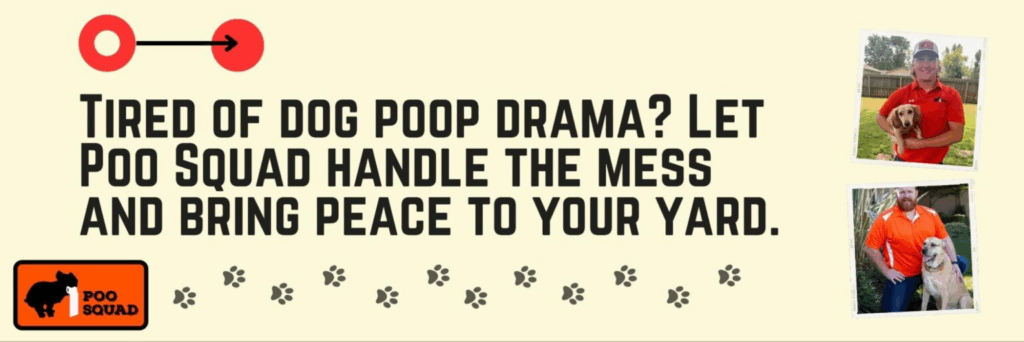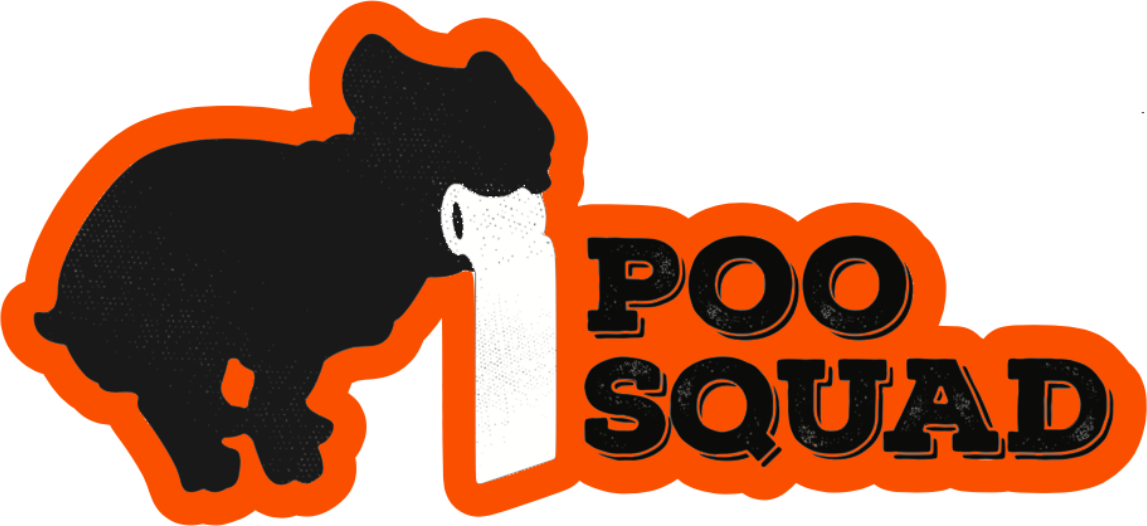Yes, dog poop is dangerous to humans. It carries bacteria, parasites, and viruses that can cause serious illness, especially in children, seniors, and immunocompromised people. Even dried or decomposed waste contaminates soil, spreads disease, and pollutes local water systems.
Dog poop is more than a backyard annoyance. It’s a biohazard.
- One gram can contain over 23 million bacteria, including E. coli and Salmonella.
- Parasites like roundworms can survive for weeks in your soil, grass, and garden beds.
And yet, many homeowners unknowingly treat it like fertilizer or let it sit until the next yard day. L m/If you’ve ever mowed over a pile or figured it would “break down on its own,” you’re not alone, but you’re also at risk.
- Bacteria from pet waste doesn’t disappear when the poop dries.
- It spreads into your soil, onto your shoes, and into your home.
- Exposure can lead to skin infections, digestive illness, and respiratory problems.
Why dog waste is dangerous, how it spreads illness without direct contact, and which habits cause more harm than good. Whether you’re a parent, pet owner, or property manager, understanding the health and environmental risks of dog poop is the first step to protecting your family, and your lawn.
What’s actually in dog poop, how long the health risks last, and what safe removal looks like, keep reading. We’re here to make sure your yard is clean and truly safe.
What Makes Dog Poop a Health Hazard?

Dog poop is not only an eyesore, it’s loaded with pathogens that can seriously impact human health. Even when it looks dried out or harmless, it can contain parasites, bacteria, and viruses that survive for weeks or even months in your soil, grass, and garden beds.
23 Million Bacteria Per Gram: What’s Really in Dog Waste?
One gram of dog poop can carry up to 23 million fecal bacteria. That includes E. coli, Salmonella, and fecal coliforms, organisms responsible for stomach illnesses, skin infections, and even more serious conditions.
These aren’t rare cases either. These pathogens are found in the waste of otherwise healthy dogs, which is why we offer a Dog Poop Report Card during service visits to alert owners to potential health concerns.
Parasites That Linger in Your Yard
Many pet owners don’t realize that worms like roundworms and hookworms can live in poop and continue to infect humans through contaminated soil. Roundworm eggs, for example, can survive in the ground for years.
If your child walks barefoot through the yard, or your dog steps in an old pile and brings it indoors, that danger multiplies.
This is one reason why our technicians sanitize their tools and shoes in every yard. We’re not only removing waste, we’re breaking the cycle of transmission before it hits your family or your pets.
Harmful Even When It Disappears
Some homeowners believe that once poop decomposes, it becomes harmless. That couldn’t be further from the truth. Because it “breaks down” doesn’t mean it’s gone.
The harmful pathogens linger in the soil, and can still infect people months later. This is especially dangerous when people unknowingly use that soil for gardening.
If you’re using your backyard for growing vegetables or letting your kids play freely, this is not a gamble worth taking. We also offer yard sanitation and deodorizing services to treat those areas safely and thoroughly.

How Can Dog Poop Make Humans Sick?
Dog poop doesn’t need to touch your mouth to make you sick. Pathogens spread through skin contact, inhalation, and runoff. Whether it’s tracked indoors on your shoes or washed into your garden by rain, the bacteria in pet waste can easily find its way into your daily life.
Contact, Skin Absorption, and “Yard Exposure”
You don’t have to pick up dog poop barehanded to be at risk. Parasites like hookworms and roundworms can enter through the skin, especially if you’re walking barefoot or kneeling in grass that’s been contaminated.
We’ve seen homeowners with raised garden beds unknowingly expose themselves to soil-borne pathogens because they didn’t realize the poop from months ago still posed a risk.
This is exactly why we created the Triple Gate Check Guarantee. Our scoopers send you a photo showing your gate closed and latched, ensuring your yard is secure and freshly serviced.
The “I Mow Over It” Myth
We’ve heard it more times than we can count: “I mow over it.” The problem? That mower doesn’t eliminate anything. It aerosolized the bacteria, spraying harmful microorganisms across your lawn, garden beds, and even your porch. It’s a health hazard, not a shortcut.
One of our early customers told us they thought mowing was helping “fertilize” the lawn until they noticed their grass turning yellow and their kids getting rashes. That’s not compost, that’s contamination.
When It Rains, It Spreads
Even if you think the poop is isolated in one corner of the yard, rainwater can carry those bacteria across your property, and straight into nearby drains. That’s how pet waste contributes to stormwater pollution and bacteria spikes in community water systems.
We offer commercial poop scooping services for HOAs and public parks. When one property neglects the problem, the whole neighborhood pays for it.
Who’s Most at Risk?
While dog poop is harmful to everyone, certain people face greater risk. Children, seniors, and those with compromised immune systems are especially vulnerable to the parasites and bacteria lurking in pet waste, even weeks after it’s been left behind.
Kids, Seniors, and Immunocompromised Individuals
Small children are the most frequent victims of exposure. They crawl, play, and put their hands in their mouths without hesitation. Add in a contaminated yard or sandbox, and you’ve got the perfect setup for illness.
One mom even told us her toddler got sick after playing where she thought the poop had already decomposed. That’s a story we hear far too often.
Older adults and those with weakened immune systems can also suffer serious consequences from pathogens that healthy people might shake off. That’s why many families rely on our sanitation and deodorizer service to go beyond basic cleanup and truly protect their loved ones.
“It Looks Like Dirt, So It’s Fine”, Not Quite
One of the most common worries we hear is whether poop that looks like it has “turned to dirt” is still dangerous.
The answer?
Absolutely. Because it’s no longer visible doesn’t mean the bacteria and parasites are gone. Eggs from roundworms can linger in the soil for years, silently waiting to infect a new host.
And if you’re growing flowers, herbs, or vegetables nearby, that contamination spreads easily into raised beds or compost. We’re often asked if poop is safe to use in non-edible gardens, but the truth is: unless it’s been professionally treated and removed, it’s not worth the risk.
Is Dog Poop Harmful to the Environment?
Dog poop doesn’t only threaten your family’s health, it can damage entire ecosystems. From polluting waterways to killing your grass, the environmental impact of pet waste is significant. What seems like a backyard issue quickly becomes a neighborhood, and even city-wide, problem.

Pet Waste and Water Contamination
Pet waste is considered a nonpoint source pollutant by the EPA, right up there with oil, pesticides, and toxic chemicals. When it rains, that bacteria-rich waste runs off into local waterways, raising contamination levels.
In some cities, up to 30% of harmful bacteria in stormwater have been linked to dog poop.
We’ve worked with communities that had to shut down beaches and restrict shellfishing because of spikes in E. coli traced back to untreated pet waste. It’s not about being a good neighbor, it’s about being a responsible part of your ecosystem.
Our commercial pooper scooper services are designed to help HOAs, parks, and public spaces avoid these risks.
Why Dog Poop Kills Grass, Not Feeds It
Many people mistakenly believe dog poop acts like fertilizer. In reality, it does the opposite. Unlike cow manure, which is herbivore-based, dog waste is protein-rich and highly acidic.
It releases ammonia and nitrogen that burn grass and destroy soil health. This is especially true when it’s chopped up by a mower and left to “decompose.”
We’ve seen customers try to fix dead patches with reseeding and topsoil, only to realize the problem keeps coming back. The answer isn’t grass seed, it’s consistent waste removal and treatment with our yard sanitizing service.
Helpful Resource -> Full Guide On Dog Poop Killing Grass
Long-Term Contamination in Soil and Gardens
Is it okay to compost poop in cardboard?” or “Can I bury it in my garden?”
While these might sound like eco-friendly options, they create hidden hazards. Poop composted improperly can leach pathogens into the ground. And buried waste doesn’t decompose safely, it ferments, leaks, and spreads bacteria over time.
If you’ve unknowingly used contaminated soil, don’t panic, but don’t grow food there either. Let us know, and we’ll help you assess whether sanitation is possible or if you need to avoid the area for future planting.
Can Pet Waste Affect My Dog’s Health Too?
Dog poop is not only a risk to humans, it’s a health threat to your pets as well. Left untreated, waste becomes a breeding ground for parasites and bacteria that can re-infect your dog, even if they’re up-to-date on medications.
Reinfection Through Exposure in the Yard
It’s common for pet owners to assume that once a dog has been treated for worms or giardia, the problem is solved. But if infected waste is left in the yard, your dog can step in it, sniff it, or even ingest contaminated grass, and get sick all over again.
We’ve seen this happen with even the most responsible owners. That’s why our residential pooper scooper service includes routine cleanups and optional sanitation, especially important for multi-dog homes or households with puppies.
Dirty Tools, Dirty Shoes: The Cross-Contamination Cycle
It’s not only the poop itself. Scoopers who don’t sanitize tools between yards can carry bacteria from one property to the next. This is especially risky if a dog at a prior stop had parvovirus, worms, or other transmittable illnesses.
Our team follows strict sanitation protocols, disinfecting tools, and footwear after every single yard. We also wear bright orange uniforms and carry verified Poo Squad IDs, so you know who’s in your yard and that they’re trained to protect both your family and your pets.
How to Handle Dog Poop Safely
Keeping your family safe starts with how you deal with dog waste. Whether you’re cleaning up yourself or using a professional service, proper handling, disposal, and hygiene habits are key to avoiding unnecessary health risks.
What We Recommend (and What the EPA Agrees With)
The safest way to dispose of pet waste is either to flush it down the toilet or bag it and place it in the trash. Never dump it in a storm drain, compost pile, or open space. Dog poop is not organic waste, it contains harmful pathogens that require sanitary disposal.
We follow these guidelines every day in the field, and if you’re one of our residential customers, you can rest easy knowing your waste is being managed in a way that’s safe for your family, your pets, and the environment.
What Not to Do (Seriously, Don’t)
A few common (and risky) behaviors we’ve heard from new clients:
- “I buried it in the corner of the yard.”
- “I throw it into the compost bin.”
- “It’s cold out, so I leave it until spring.”
- “It’s fine in flower beds, right?”
None of these options are safe. Burying waste doesn’t neutralize bacteria. Compost bins rarely reach the temperature needed to kill parasites. And waiting for winter to end only creates a biohazard come thaw. One of our customers found this out the hard way when their spring garden smelled like a kennel and not the clean kind.
How We Keep It Safe
We don’t use your tools, your trash cans, or your water. Every member of our team brings their own sanitized gear and handles all waste removal offsite (except in areas like New Jersey where regulations require otherwise).
Our yard deodorizer and sanitation service is a great add-on for anyone who wants that extra level of cleanliness, especially after illness, heavy use, or winter buildup.

What If You Already Have Contaminated Soil?
If your yard has been a “poop zone” for months, or even years, you’re not alone. But you should know that soil contaminated with pet waste can pose ongoing health risks, especially for children, pets, and gardeners. Thankfully, there are ways to address it.
Can It Be Fixed?
Yes, but not without intention. The first step is consistent, professional removal of all visible waste. Our pooper scooper services go beyond scooping, we’ll alert you if the area needs deeper sanitation.
From there, we recommend treating the affected soil with pet-safe cleaning solutions and keeping pets and people off the area during recovery.
If you’re unsure whether your soil is safe, err on the side of caution. Our yard sanitizing service is built for this scenario, and we’ve helped dozens of families safely reclaim their backyards.
How Long Does the Risk Last?
Parasite eggs like those from roundworms can survive in soil for years, long after the waste has broken down. If your dog had parasites and pooped in the same spot repeatedly, those zones need more time to be safe again.
We’ve seen homeowners plant gardens, thinking a few months was enough for the soil to “reset.” But unless it’s been treated and tested, there’s no guarantee. If you’ve got kids playing in the dirt or pets who dig, you want to be sure it’s clean.
How Often Should Dog Poop Be Picked Up?
Timing matters more than people think. Leaving dog waste in your yard for even a few days increases the risk of illness, odor buildup, and contamination. The idea that “it’s fine for a week or two” is one of the most common, and dangerous, misconceptions we see.
The Timing Myth: “It’s Been About 2 Weeks”
We hear it from new clients constantly, and it’s almost always followed by a yard full of buried or dried-out waste. Even after a few days, poop begins to leach bacteria into your soil, attract pests, and pose risks to your family.
This is why our residential poop scooping service includes automated reminders and scheduled pickups. We show up on time, every time because consistency is what keeps your yard truly clean.
Why Consistent Cleanup Is Non-Negotiable
Picking up poop only when it becomes “noticeable” means harmful bacteria have already done their damage. Regular weekly cleanups (or more often for multi-dog homes) keep your yard safe, your pets healthy, and your family stress-free.
And for those who want total peace of mind, our deodorizer and sanitation add-on gives your lawn a reset with each visit, neutralizing odors and bacteria before they spread.

Is Dog Poop Dangerous?
Dog poop is not only gross, it’s a health threat, an environmental pollutant, and a safety risk for your pets and your family. From spreading parasites and bacteria to killing your lawn and contaminating your garden, untreated waste causes more problems than most people realize.
Our mission is simple: protect your time, your home, and your health, without you having to think about it.
That’s why every one of our services, from routine poop pickup to yard sanitization, is designed with your safety in mind. We show up on time, in uniform, with our tools, and we leave nothing behind but peace of mind.
If you’ve ever worried that dog poop might be more than a nuisance, you’re right. But the good news is, you don’t have to deal with it alone.
